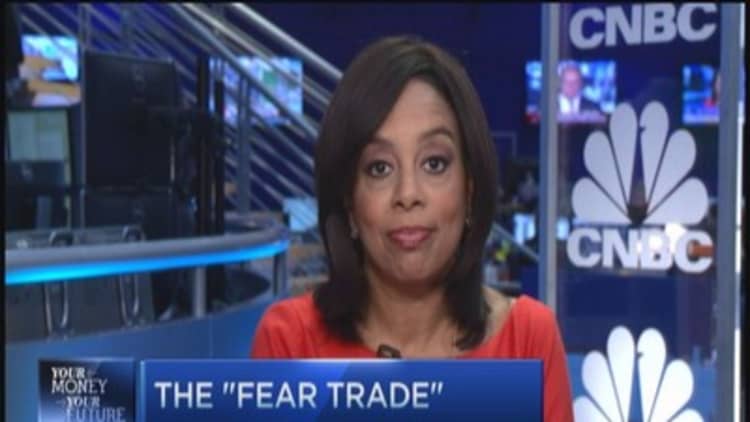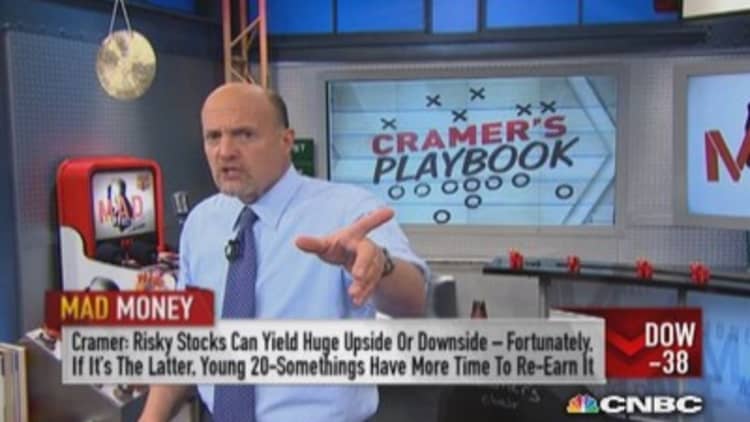One of the most daunting decisions faced by workers is how to invest their 401(k) plan dollars.
The simplest choice might be a target-date fund, which automatically shifts from aggressive to more conservative investments the closer you get to retirement. But some financial advisors say if you have the wherewithal, it's worth building a 401(k) portfolio that provides a more individualized investment approach tailored to your particular goals and life situation.
"If you have the opportunity to take a more precise approach, it's a good thing to do," said Jared Snider, a wealth advisor with Exencial Wealth Advisors. "Sometimes one-size-fits-all ends up not fitting any one individual the best."
As of June 30, 401(k) plans held an estimated $4.4 trillion in assets, according to the Investment Company Institute. Data from research firm Morningstar shows that $690 billion of that was parked in target-date funds.
Read MoreHow to balance your own portfolio
So clearly, the majority of 401(k) investors are building their portfolios using investments outside of target-date funds. The problem, though, is that many people just randomly choose those investments.
"I come across people who have picked multiple [funds], and there really wasn't a well-thought-out purpose for why they picked the funds they did," Snider said.

The first thing to do is look at your 401(k) in the context of all your assets, advisors say. If you also own, say, an individual retirement account or taxable accounts—savings or stock accounts—make sure the asset allocation in your 401(k) reflects your overall holdings so you are not too heavily invested in any one market sector or lack exposure to stocks.
Also consider your risk tolerance. That is, determine to what degree you can tolerate large swings in the value of your investments due to market volatility. People who misjudge their risk tolerance might panic during a market drop and unload investments, which advisors say is unwise.
Read More What to do with after-tax 401(k) savings
Regardless of whether you have 100 percent of your 401(k) in stocks or you have, say, 70 percent in stocks and 30 percent in fixed income such as cash or bonds, Snider said his firm generally approaches the stock—or equity—portion the same.
The tricky thing for advisors is that when it comes to a 401(k), the ideal allocation for clients is only possible to the extent that the plan allows it.
"What's unique to 401(k) plans is that you have to use the choices the plan gives you—good, bad or indifferent," said Charles Bennett Sachs, a certified financial planner with Private Wealth Counsel. "I try to find the least offensive funds that give me the allocation I want for my client."
Meanwhile, Snider at Exencial said his firm's ideal equity allocation, based on current market valuations, includes 20 percent in U.S. large-value funds and 13 percent in an S&P Index fund. That is, a fund that mimics that performance of the , which offers broad U.S. market exposure.
Read MoreTony Robbins: What top investors do
Additionally, Exencial dedicates about 11 percent of assets to large-cap growth funds, about 10 percent to mid-cap funds and roughly 16 percent to small-cap value funds.
Missing from that U.S. market mix is small-cap growth funds.

"We tend to not like the valuations we're seeing on small-cap growth funds," Snider said. "They are a little rich right now. If the plan only offers a small-cap growth fund [vs. value], we'll put that money in a mid-cap fund."
The international stock exposure is a bit trickier due to limited offerings in many 401(k) plans. But Snider said, if possible, his firm generally allocates about 30 percent of equity exposure to international funds. That can include value funds, large-cap funds, small-cap funds and emerging-markets funds.
Read More4 reasons to not roll over a 401(k)
"We try to give broad exposure," Snider said. "Emerging markets tend to be more volatile, so if we can, we spread it across many world economies."
He added that when U.S. stocks are trading at a premium, international stocks tend to outperform by a small margin over the ensuing five years.
Meanwhile, Jorge Padilla, a certified financial planner with The Lubitz Financial Group, said his firm tries to represent the world market capitalization.
"If you look at the size of the U.S. stock market [in the context] of the whole world, it is about 46 percent of the world's stock valuation," Padilla said.
Read MoreBiggest stock 'bubble' mistakes
He added that his firm has been taking profits from the U.S. market and investing in overseas markets, where valuations are more promising for the next five or 10 years.
But Padilla's advice comes with a caveat. "No one knows with confidence what will happen in the next six months or a year," he said.
In the current interest-rate environment, you can't really get a lot of return in fixed income.Jared Sniderwealth advisor at Exencial Wealth Advisors
As for those whose portfolio includes fixed-income, Exencial's Snider said his firm tends to lean toward short-duration, quality bonds.
"In the current interest-rate environment, you can't really get a lot of return in fixed income," Snider said.
Read MoreTo roll or not to roll 401(k) cash?
Advisors also generally agree that once you determine your suitable allocation, it's important to rebalance your portfolio once a year so you stick to your desired allocation.
Padilla at The Lubitz Financial Group points out that some 401(k) plans have an auto-rebalance option. If you sign up for it, the plan will automatically rebalance your portfolio at set times.
"Not a lot of the plans do it, but if it's there, it's a good thing," he said. "It takes the emotion out of the process, which is important."
If you do choose to build your portfolio without the guidance of an advisor, it's important to research your plan's options and attend any workplace educational seminars.
Read MoreWeigh feistier bond alternatives
"Take advantage of that opportunity and get help creating an allocation," Snider at Exencial said. "Or if your employer has a model portfolio created, you can [mimic] that so you can stay on track and have a successful retirement."
—By Sarah O'Brien, special to CNBC.com





